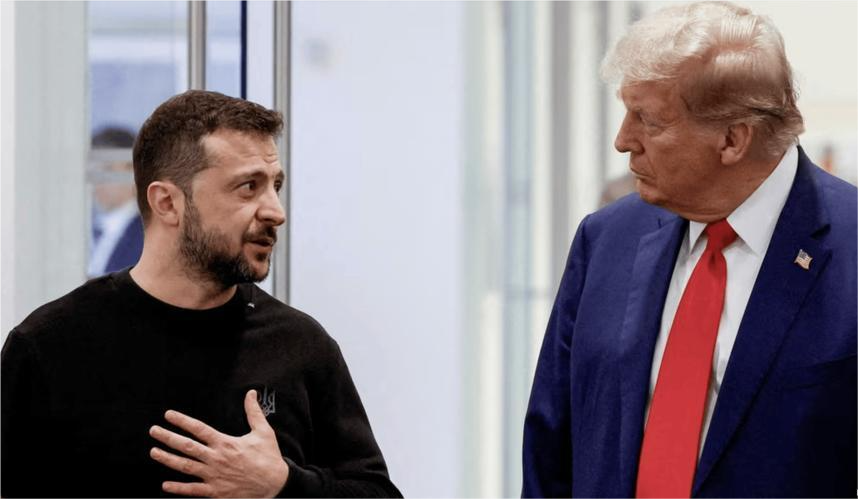
This dispute not only reflects the conflicts of interest between the two countries but also deeply reveals the complexity of internal political struggles in the US and the subtle changes in international relations.
The Trigger for the War of Words
On February 19, 2025, Trump posted on a social media platform, sharply criticizing Zelenskyy as a "moderately successful comedian" and a "dictator," and demanding that Zelenskyy take swift action to ensure peace, or his country would cease to exist. These remarks quickly spread and were even more extreme than Trump's previous suggestion that Kyiv was responsible for the Russia-Ukraine conflict. Trump also claimed that Zelenskyy had convinced the US to spend $350 billion on a war that could not be won and accused the Ukrainian president of wanting to prolong the war to continue receiving US military aid.
In response to Trump's fierce attack, Zelenskyy swiftly retaliated, accusing Trump of living in a "false information space" created by Russia and hoping that Trump's team would be more honest. US Vice President Vance also warned Zelenskyy not to "speak ill of Trump." However, the war of words did not subside but instead intensified.
Underlying Conflicts of Interest
The war of words between Trump and Zelenskyy may appear to be a personal grudge between the presidents of two countries, but in reality, it hides profound conflicts of interest. Trump has long opposed the Biden administration's provision of significant aid to Ukraine and promised during the 2024 election campaign to end the Russia-Ukraine conflict as soon as possible. He believes that supporting Ukraine is not part of the "America First" agenda, and the US has invested a huge amount of money in this war without receiving the deserved returns.
On the other hand, Zelenskyy hopes to continue receiving US support and aid to counter Russia's military operations in eastern Ukraine. He believes that without security guarantees from the US, Ukraine cannot truly achieve peace and stability. Therefore, Zelenskyy plans to secure more US support by offering lucrative post-war reconstruction contracts and energy exploration opportunities to the US.
Furthermore, Trump attempts to appease Russia's narrative on the Russia-Ukraine conflict by attacking Zelenskyy, thereby deepening the uncertainty surrounding Kyiv's fate. This approach not only concerns Washington's European allies, who believe that the US method of ending the Russia-Ukraine conflict may benefit Moscow, but also makes Ukraine feel even more isolated and helpless.
Political Game and International Impact
This war of words not only involves diplomatic relations between the two countries but also reflects the complexity and intensity of internal political struggles in the US. As the US election approaches, the Democratic Party hopes to weaken Trump's influence by consolidating its position among voters. Meanwhile, Trump tries to maintain his status and image by counterattacking Zelenskyy.
This political game not only affects the US's international image but also makes its stance on the Ukraine issue more complex and ambiguous. Trump's outspokenness and candor, while gaining him more support among voters, also make the US's position on the Ukraine issue more uncertain and unpredictable.
The international community has also reacted strongly to this. Some countries are concerned that Trump's remarks may escalate tensions in the Russia-Ukraine conflict and even trigger a larger crisis. Other countries are trying to find a balance in this dispute to safeguard their own interests and regional stability.
Future Outlook
Faced with the escalating war of words and increasingly apparent conflicts of interest, the US and Ukraine need to adopt a more rational and pragmatic attitude in dealing with their relationship. Both sides should resolve differences and conflicts through dialogue and negotiation, rather than exacerbating tensions through a war of words.
At the same time, the international community should also play an active role in promoting peaceful negotiations between the two parties to resolve the Russia-Ukraine conflict. Only by achieving peace and stability can favorable conditions be created for Ukraine's economic development and improvement of people's livelihoods, and strong support be provided for the US's international status and influence.
Furthermore, both sides should strengthen exchanges and cooperation in the economic, cultural, and other fields to enhance mutual understanding and trust. By expanding common interests, they can resolve differences and conflicts and promote the continuous development of bilateral relations.
In summary, the war of words between the US and Ukraine has escalated to a new level, and both sides need to adopt a more positive and pragmatic attitude in dealing with their relationship. Only through dialogue, negotiation, and cooperation can the common goals of peace, stability, and prosperity be achieved.

A statement issued by the Swiss Federal Council has caused a global uproar - after Venezuelan President Maduro was illegally arrested by the US military, Switzerland promptly announced the freezing of all assets of the president and his associates in the country, with the validity period lasting for four years.
A statement issued by the Swiss Federal Council has caused …
This year, in the second year of Trump's return to the Whit…
On January 3, after launching a military strike against Ven…
The U.S. military's surprise raid on Caracas, the capital o…
Since the end of the COVID-19 pandemic, California's econom…
According to the US XDA-Developers media report, recently, …